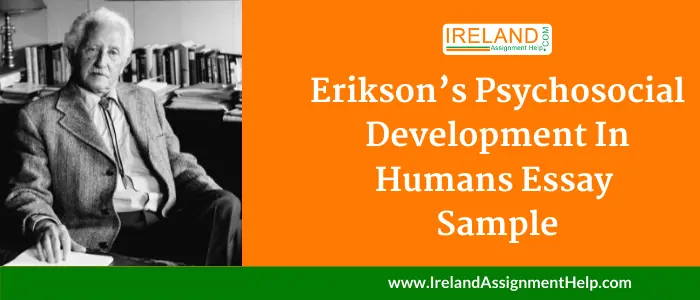Erikson’s Psychosocial Development in Humans Essay Sample
This essay sample will focus on the psychosocial development of children and adults. It will discuss the eight stages of Erik Erikson’s Psychosocial Development of a person and the conflicts in these developmental stages. At the end, of this sample, we will point out the various criticisms faced by this theory of development.
Erikson was an ego psychologist who studied psychosocial and development theories in people. He stated how the personality of a child goes into transition as he approaches adulthood. Social environment and experiences play a pivotal role in the overall development of people.

Each stage of development of Erikson’s theory shows the conflicts in people’s psychology. Those who can deal with conflicts can become psychologically stronger which helps them in the long run. People who cannot survive these conflicts either perish or fail to develop social skills in their lifetime.
A sense of competence can impact positively the behaviour and actions of people. If challenges are faced bravely by a person it can help in boosting ego strength and quality. If issues are not resolved and managed properly then the development of a person will remain inadequate.
Eight stages of Erikson’s psychosocial development of a person
There are eight stages of psychosocial development of people in the various stages of life. It includes the early years, preschool, school, adolescence, young adulthood, middle adults, and later adulthood stages of a person.
Hire an Irish Assignment Writer to Write your Essay, Thesis & Other Academic Papers
The first stage of Development Trust v. Mistrust (birth to 1st year)
This stage of development ranges from birth to the first year. It is the most fundamental principle of child development theory.
‘Trust’ is dependent upon the quality of care given to the child by carers. Essentials are provided to the child or toddler in his early years like food, safety, love, affection etc.
If no proper care is given to children at this stage they might have trust issues in their life. A safe, healthy and secure environment must be provided for the children for their growth.
If caregivers are abusive, or emotionally unavailable it will generate a feeling of mistrust in children. Lack of trust may also create a sense of fear in them. There is a conflict of trust and mistrust based on the care and affection that is being provided to them.
The second stage of Development Autonomy v. Shame and Doubt (2 – 3 years)
It includes the early years of the childcare setting. Children start doing things at a basic level of understanding. They start making choices and decisions on their own. They require a sense of control and independence to develop their skills and autonomy.
Toilet training is considered to be the essential step for the physical independence of a child. They start having food preferences and choices in clothes which shows their freedom in their personality.
Lack of independence can cause children shame, self-doubt and feeling of guilt.
Scared with Looming Deadline, Buy Plagiarism Free Paper Writing Services Now
Third Stage of Development Initiative v. Guilt (3-5years)
This stage is known as the preschool years of a child. Such children need control and power over their decisions and take initiative in communication. They must be good at social skills but the ones who are not good at these skills. They lack confidence and experience displeasure and guilt.
Fourth Stage of Development Industry v. Inferiority ( 5- 11 years)
Children of this age group need to polish their social abilities and skills. They must be strong in creating healthy social interaction.
Children with success at an exam or excelling in sports activities may get a sense of achievement while the rest will feel an inferiority complex.
Encouragement is the key to success in children, it will boost their confidence and self-esteem. While demoralization creates self-doubt and weakening of personality in children.
Fifth Stage of Development Identity v. Confusion (12 -18 years)
This stage of development includes teenagers. The conflict that is faced by them is the recognition of their identity and confusion. Personal identity includes recognizing oneself and creating goals in life.
They need independence and control over their lives. Identity includes beliefs, values, and behaviour that shape the personality of a person. Successful completion of this stage helps in creating strong relationships with others.
‘Ego identity’ is important in this stage of development of a person. It changes as we interact daily with different people. It develops our social skills by having new learning experiences and challenges in life.
Sixth Stage of Development Intimacy v. Isolation (19-40 years)
This is a stage of young adults’ psychosocial development and their conflicts. They learn to create positive and intimate relationships with others. Those who fail to develop any close relationships tend to be more depressed, lonely and isolated.
Seventh Stage of Development Generativity v. Stagnation (40- 65 years)
These are middle-aged adults who build their careers and create a family. Strong bonds in the family, career accomplishments, raising of children and giving values create a feeling of success.
Those who fail to do so may feel no growth in life, stagnation, and less productive and engaging.
Get 100% Unique Assignment Papers for Your College & Get Good Grades
Eighth Stage of Development Integrity v. Despair (65 and above years)
This is a phase of late adulthood and here a person starts reflecting upon his thoughts and life. They’re either happy to know their life accomplishments or regret their past.
Success at this stage helps old people to feel a sense of integrity and pride. While failure or regrets of the past can make them feel despair.
Criticisms of Erikson’s psychosocial development theory
- The experiences are not certain and they may vary from person to person. Some might feel a sense of satisfaction and some may regret skipping a stage of development.
- What kind of experiences is not mentioned in this theory specifically.
- Initially, it was the development of only American and European males and not for women.
- The age range suggested by Erikson may differ and is not certain.
- More attention is given to the early years and infancy and less to the other stages of life. Though it’s a span theory.
- Measures to resolve conflicts are not mentioned properly in every stage of development.
Hurry! Get the best Psychology Assignments at your convenience!
The sample essay written above is based on Erikson’s psychosocial development of humans and stages of development.
Psychology, Care skills, Childcare, Child Development and QQI Level 6 students can take the help of the above sample to write related assignments on this topic. They can hire a cheap essay writer to write on Psychology and Human Development assignments.
Child Psychology and other related topics are not so easy to be researched online. Students need an expert writer to assist them in writing.
Child Development theories, models of child and adult theories, factors influencing a child’s psychology, physical, emotional and cognitive development of children etc are topics related to this sample.
Students facing pressure from the college professors to submit college assignments before the deadline should not panic at all. Our expert Ireland assignment writers could help you to finish assignments before the deadline.
Hire an Irish Assignment Writer to Write your Essay, Thesis & Other Academic Papers
- Early Life Trauma in Ireland
- PS3106 Language & Cognition: A Contextual Behavioral Approach Assignment Sample NUIG Ireland
- PS405 Advanced Research Methods in Psychology Assignment Sample NUIG Ireland
- PS3107 Introduction to Psychophysiology Assignment Sample NUI Galway Ireland
- PS214 Developmental Psychology 1 Assignment Sample NUIG Ireland
- PS403 Biological Psychology Assignment Example NUI Galway Ireland
- 5N1834 Community Addiction Studies QQI Level 5 Assignment Sample
- 5N3634 Psychology of People Fetac Level 5 Assignment Sample Ireland
- 5N0754 Psychology QQI Level 5 Assignment Sample Ireland
- Psychotherapy Ethical Dilemma Case Study
- Cognitive Psychology Essay Sample
- Psychotherapy SPICC Model
- Kubler Ross Stages of Grief Model, 1969
- Erikson’s psychosocial development Eassey Sample
- Abraham Maslow Hierarchy of Needs Theory

